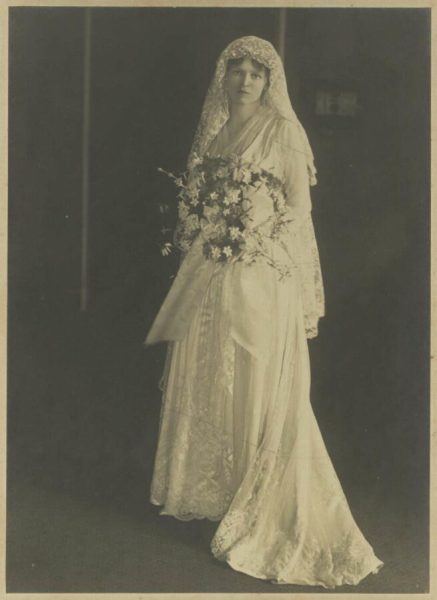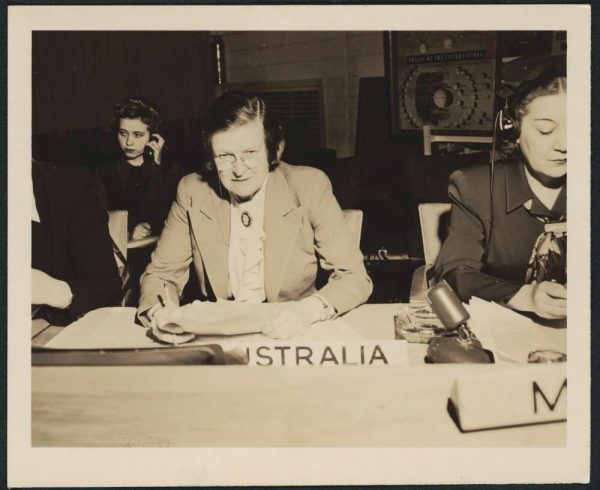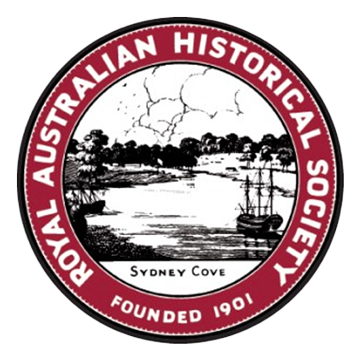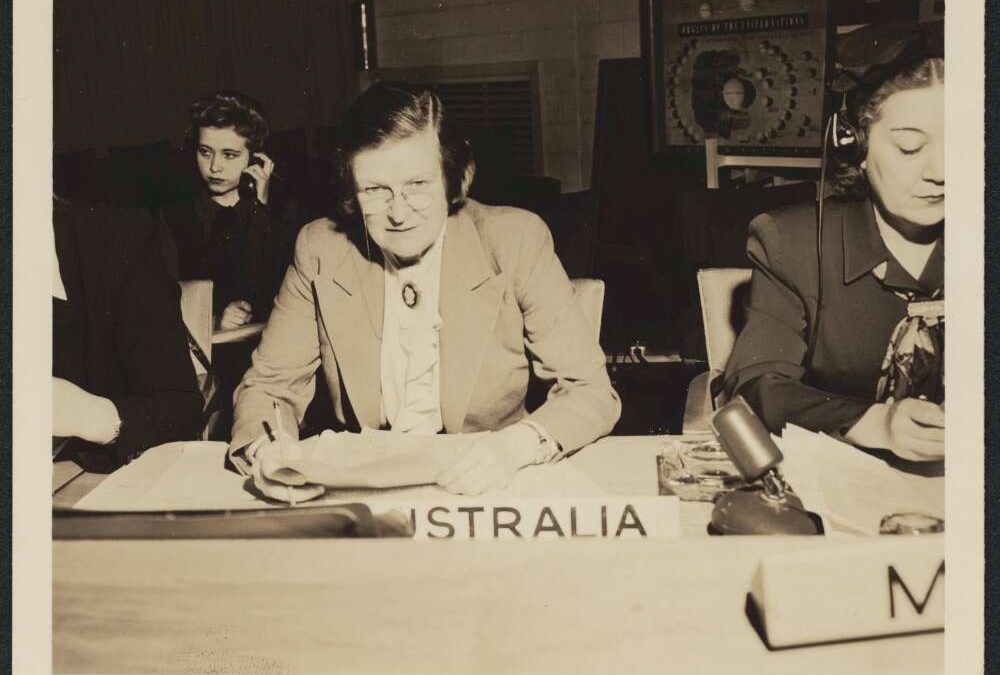Written by Elizabeth Heffernan, RAHS Intern
To celebrate Women’s History Month in 2021, the Royal Australian Historical Society will continue our work from previous years to highlight Australian women that have contributed to our history in various and meaningful ways. You can browse the women featured on our webpage, Women’s History Month.
Feminist, activist, and diplomat Lady Jessie Street was an instrumental figure in Australian and world politics during the twentieth century. Today the Jessie Street Trust provides funding for the causes she championed, including peace, disarmament, and Aboriginal and women’s rights. The Jessie Street National Women’s Library in Ultimo similarly ensures the preservation and promotion of our country’s female cultural heritage. [1]

JESSIE STREET, NÉE LILLINGSTON, ON HER WEDDING DAY. [IMAGE COURTESY NATIONAL LIBRARY OF AUSTRALIA, NLA.OBJ-231550690-1.]
Jessie was a pivotal figure in university life, both during and after her degree. She was captain of the university’s women’s hockey team, the founding member and later president of the university’s Women’s Sports Association, a long-term councillor of Women’s College, and an executive-member and briefly president of the Feminist Club. This latter position led to her election as president of the United Associations of Women in 1930. She held office periodically for the next twenty years, giving her a platform to pursue such campaigns as women’s employment, marriage, and child endowment rights. [2]
Jessie’s most significant achievements occurred during and after the Second World War. She organised the Australian Women’s Conference for Victory in War and Victory in Peace, whose stipulations for the political, social, and economic mobilisation of women post-war were codified in the 1943 Australian Women’s Charter. Inspired by a 1938 visit to the seemingly progressive USSR, she also spent much of the war organising Russian aid. This notably included her ‘Sheepskins for Russia’ appeal. [3] Though never a member of the Communist Party, Jessie’s Soviet sympathies persisted into the Cold War. She would later earn the moniker ‘Red Jessie’ in the right-wing Australian press. [4]

JESSIE STREET REPRESENTING AUSTRALIA AT THE UNITED NATIONS, C. 1945. [IMAGE COURTESY NATIONAL LIBRARY OF AUSTRALIA, NLA.OBJ-231553937.]
Jessie died in Paddington in 1970. A newspaper article written in 1945 described “Mrs Jessie Street—she took her Ironworkers’ union card and photos of her four grandchildren to the San Francisco Conference.” Such mementos remind us of the reasons why she worked “unsparingly” to change the world. [6]
The Jessie Street papers were inscribed into the UNESCO Australian Memory of the World Register on 26 February 2021. The Jessie Street papers covering 1914 to 1968 are held in the National Library of Australia. They document her personal and family life, political involvement in women’s issues and feminist activities, the peace movement and campaigns to ban nuclear weapons, the formation of the United Nations and the UN Status of Women Commission, relations between Australia and Russia, Aboriginal rights and race relations.
References:
[1] Maryanne Doyle, ‘Women’s Rights and the UN’, National Film and Sound Archive of Australia, https://www.nfsa.gov.au/latest/jessie-street, accessed 8 February 2021; Jessie Street National Women’s Library, accessed 11 February 2021, https://www.nationalwomenslibrary.org.au/.
[2] Heather Radi, ‘Street, Lady Jessie Mary (1889-1970)’, Australian Dictionary of Biography, National Centre of Biography, Australian National University, https://adb.anu.edu.au/biography/street-lady-jessie-mary-11789, accessed 8 February 2021.
[3] Radi, ‘Street, Lady Jessie Mary’; ‘Jessie Street’, Jessie Street Trust, https://www.jessiestreettrust.org.au/jessie, accessed 8 February 2021.
[4] Radi, ‘Street, Lady Jessie Mary’; ‘Jessie Street’.
[5] Doyle, ‘Women’s Rights and the UN’; Radi, ‘Street, Lady Jessie Mary’.
[6] Colin Simpson, ‘A Woman’s Hopes of UNCIO’, in Papers of Jessie Street, circa 1914-1968, National Library of Australia, http://nla.gov.au/nla.obj-231547938, accessed 8 February 2021.


0 Comments